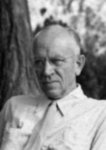

The Leopold Writing Program (LWP), a New Mexico-based nonprofit, is celebrating the 15th year of its environmental essay writing contest, which is open to all sixth-12th graders in New Mexico.
The 2023 contest features nearly $3,000 in scholarship awards for the best student essays in three age categories, LWP said in a news release. The deadline for submissions is Wednesday, Feb. 15. Entries should be emailed to LeopoldWritingContest@usgo.net. Visit www.leopoldwritingprogram.org/writing-contest.html for contest details.
The contest honors Rand Aldo Leopold (1887-1948), a writer, philosopher, naturalist and conservationist who wrote “A Sand County Almanac” in 1949.
Leopold was assigned to the U.S. Forest Service’s (USFS) District 3 in New Mexico and Arizona territories in 1909 as a forest assistant and remained in New Mexico until 1924. He wrote the USFS’s first game and fish handbook and proposed creation of the Gila Wilderness Area, the USFS’s first national wilderness area. Leopold also developed the first comprehensive management plan for the Grand Canyon.
In 2022, nine middle and high school students read their essays aloud to an assembled group of families, educators and friends in the Old Senate Chamber at the Bataan Memorial Building in Santa Fe, the news release said. This year’s winners will be invited to read their essays at the Indian Pueblo Cultural Center in Albuquerque on Earth Day, April 22 (the day after the 75th anniversary of Leopold’s death).
Also in April, the annual Leopold lecturer is Robin Wall Kimmerer, recent recipient of a MacArthur Fellowship and author of the award-winning book, “Braiding Sweetgrass: Indigenous Wisdom, Scientific Knowledge, and the Teachings of Plants,” LWP said.
This year’s essay prompt is based on both Leopold’s and Kimmerer’s writings, asking students to reflect on these quotations: “Though the Earth provides us with all that we need, we have created a consumption-driven economy that asks, “What more can we take from the Earth?" and almost never, “What does the Earth ask of us in return?” (Robin Wall Kimmerer) and “We abuse land because we regard it as a commodity belonging to us. When we see land as a community to which we belong, we may begin to use it with love and respect.” (Aldo Leopold).